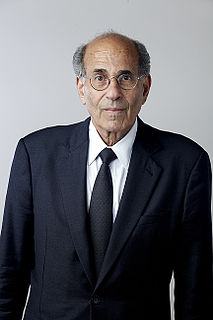A Quote by Richard Axel
All animals exhibit innate behaviors in response to specific sensory stimuli that are likely to result from the activation of developmentally programmed circuits.
Related Quotes
There are two main types of immunity to an infection. Innate immunity comes from circulating cells that attack any invader the body views as foreign. Adaptive immunity is specific to the pathogen presented. Through adaptive response, immune cells are programmed to secrete antibodies that are primed to target a viral invader.
An animal’s memory is not in words, they’ve got to be in pictures – it’s very detailed so let’s say the animal gets afraid of something. Like, for example you beat the dog up and they're looking at you and your Nike shoes or any sneaker or anything like a Nike, he's likely to be afraid of that - so anything without that Nike wingtip, he's likely to be fine. If you think about it, that's a different picture, than a Nike type shoe. Its specific because its sensory based.




































